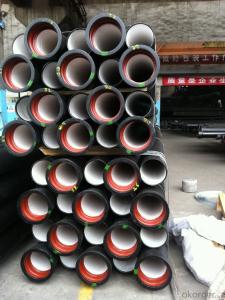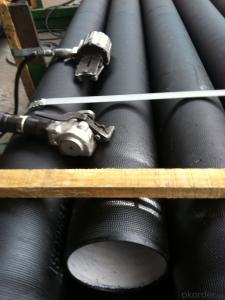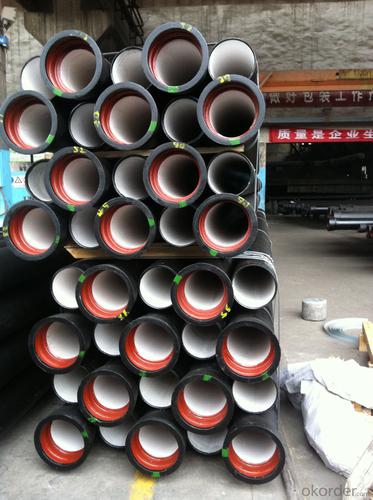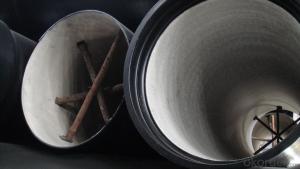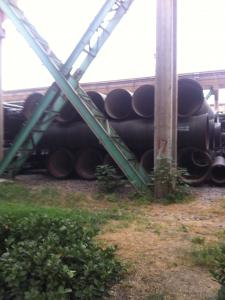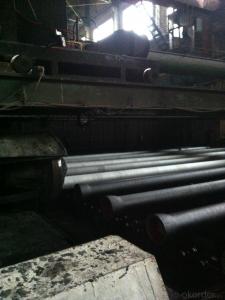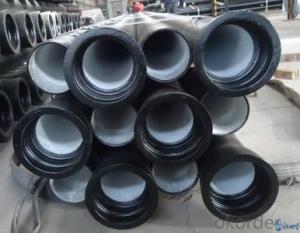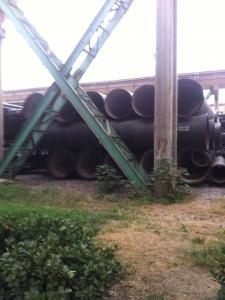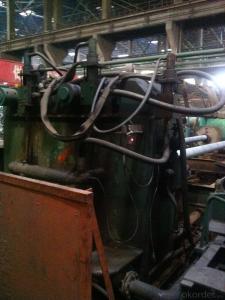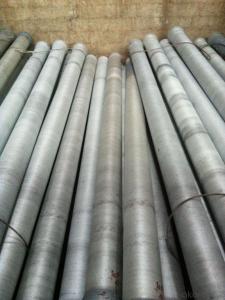DUCTILE IRON PIPE AND PIPE FITTINGS K9 CLASS DN250
- Loading Port:
- Tianjin
- Payment Terms:
- TT OR LC
- Min Order Qty:
- 20 pc
- Supply Capability:
- 3000 pc/month
OKorder Service Pledge
OKorder Financial Service
You Might Also Like
Material : Ductile Cast Iron
Size Range : DN 80mm to DN 2000mm
Unit Effective Length : 6m or 5.7m
Manufacture Standard: ISO 2531:1998/ EN 545:2006/EN 598:2007
Annual capacity : 200,000 tons
Coating Exterior: Zinc 130g/m2 according to ISO 8179-1 and bitumen coating 70 microns.
Cement Interior: Portland Cement/ High Alumina Cement/ Sulphate Resisting Cement Lining according to ISO 4179
Special requirements on external coating and internal lining can be applied
We also provide accessories such as SBR/EPDM rubber gaskets, lubricant paste, pipe caps, PE sleeves, etc.
Additional Parts:
Each pipe is strictly inspected according to related standard to ensure permanently high performance.
Easy Installation at site and service free for life
Long Service Lifespan
Quotation will arrive you within 24hours once we get your inquiry.
We guarantee offering you a competitive price.
A copy of original inspection reports of pipes will be offered after shipment.
Photos of loading process will be sent to the customer after shipment effect.
We will follow-up the delivery progress after shipment effect and update to the customer on weekly basis.
- Q: Can ductile iron pipes be used in geothermal systems?
- Yes, ductile iron pipes can be used in geothermal systems. Ductile iron is known for its strength and durability, making it suitable for various applications including geothermal systems. It can withstand high temperatures and pressures, making it an ideal choice for transporting hot fluids or steam in geothermal systems. Additionally, ductile iron pipes have excellent corrosion resistance, which is crucial in geothermal environments where the fluids can be chemically aggressive.
- Q: What is the expected burst pressure of ductile iron pipes?
- Several factors, including the diameter, wall thickness, and grade of ductile iron, can influence the expected burst pressure of ductile iron pipes. However, ductile iron pipes are typically designed and manufactured to withstand high-pressure loads. Typically, the expected burst pressure of ductile iron pipes ranges from 350 psi to 700 psi. It is important to note that this is a general range, and the actual burst pressure can vary depending on the specific design and manufacturing standards followed. To determine the exact expected burst pressure for a specific ductile iron pipe, it is advisable to refer to the manufacturer's specifications or relevant industry standards such as the American Water Works Association (AWWA) C150 or ISO 2531. These guidelines provide recommendations for ductile iron pipes and their performance under different conditions. Additionally, local building codes and regulations may also include specific requirements for the installation of ductile iron pipes.
- Q: Can ductile iron pipes be used for railway crossings?
- Yes, ductile iron pipes can be used for railway crossings. Ductile iron is a strong and durable material that can withstand heavy loads and high traffic volumes, making it suitable for railway crossings. Additionally, it has excellent corrosion resistance properties, which is important for withstanding the harsh environmental conditions associated with railway crossings.
- Q: Does the cast iron have size 250? What's the performance?
- 1, cast iron because of low melting point, casting process performance is good, because it has been widely used.2, the relative gray iron ductile iron, have higher tensile strength and impact toughness, which has better mechanical performance.
- Q: How do ductile iron pipes perform in earthquake-induced ground movements?
- Ductile iron pipes have been proven to be a dependable and resilient choice for underground infrastructure, even in earthquake-prone regions. The distinctive qualities of ductile iron, such as its strength and flexibility, enable it to withstand the impacts of ground movements during an earthquake. When an earthquake occurs, the ground shakes and shifts, exerting significant forces on underground pipes. Ductile iron pipes possess the ability to flex under these forces, absorbing the energy and minimizing the risk of failure. They can endure substantial ground movements without cracking or breaking, guaranteeing the uninterrupted flow of water or other fluids. Moreover, ductile iron pipes exhibit exceptional resistance to corrosion and are highly durable, making them suitable for long-term use in areas susceptible to earthquakes. This reduces the necessity for frequent maintenance or replacement, providing cost-effective and reliable solutions for infrastructure. Additionally, the joints employed in ductile iron pipe installations are designed to accommodate movement and permit slight adjustments during ground shifts. This adaptability prevents the pipes from becoming dislodged or separated, preserving the system's integrity. Overall, ductile iron pipes have a well-established reputation for their performance in earthquake-induced ground movements. They offer resilience, flexibility, and durability, ensuring the uninterrupted operation of water and sewer systems, even in areas prone to seismic activity.
- Q: What is the external coating used in ductile iron pipes?
- The external coating commonly used in ductile iron pipes is a protective layer made of either cement mortar or polyethylene.
- Q: What is the minimum operating temperature for ductile iron pipes?
- Ductile iron pipes typically have a minimum operating temperature of -40 degrees Celsius, showcasing its exceptional strength and ductility in cold conditions. This makes it a versatile option for various purposes, such as water and wastewater systems. Nevertheless, it is crucial to acknowledge that the specific minimum operating temperature may differ based on factors such as the grade of ductile iron employed and the requirements of the application. It is highly advisable to refer to the manufacturer's specifications and guidelines for the appropriate utilization and optimal performance of ductile iron pipes in cold temperatures.
- Q: Can ductile iron pipes be used for stormwater management?
- Yes, ductile iron pipes can be used for stormwater management. Ductile iron is a strong and durable material that can withstand the pressure and load of stormwater. It is resistant to corrosion, making it suitable for long-term use in stormwater management systems. Additionally, ductile iron pipes have a smooth interior surface, facilitating a smooth flow of water and reducing the risk of blockages.
- Q: What kind of joints are used with ductile iron pipe?
- Ductile iron pipe typically uses mechanical joints or push-on joints. Mechanical joints consist of a gland and a rubber gasket that are used to connect two pipes together. These joints are secured by bolts or other mechanical means to ensure a tight and secure connection. Push-on joints, on the other hand, do not require any bolts or additional hardware. They simply involve the insertion of a rubber gasket into the socket of the pipe, which creates a sealed connection. Both types of joints are widely used with ductile iron pipe and offer reliable and leak-free connections for various applications.
- Q: Can ductile iron pipes be used for gas distribution networks?
- Yes, ductile iron pipes can be used for gas distribution networks.
Send your message to us
DUCTILE IRON PIPE AND PIPE FITTINGS K9 CLASS DN250
- Loading Port:
- Tianjin
- Payment Terms:
- TT OR LC
- Min Order Qty:
- 20 pc
- Supply Capability:
- 3000 pc/month
OKorder Service Pledge
OKorder Financial Service
Similar products
Hot products
Hot Searches
Related keywords
